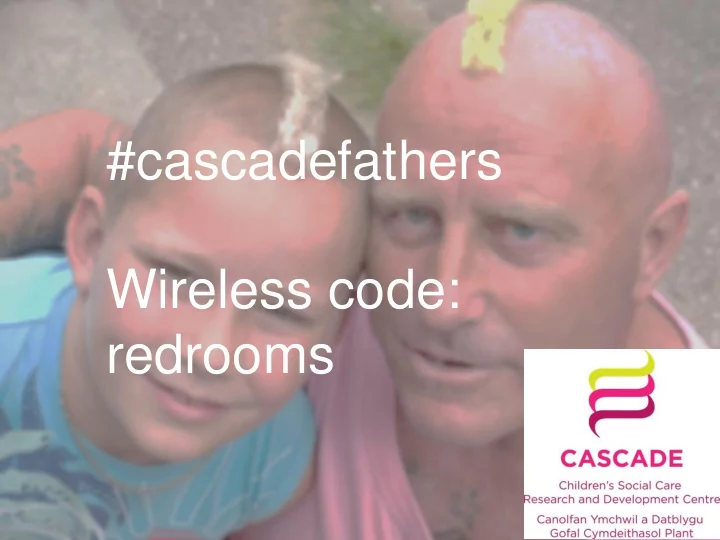

#cascadefathers Wireless code: redrooms
Working with fathers: The current state of play in the UK Jonathan Scourfield Cardiff University
Today’s talk 1. What do we know about work with fathers? 2. What do fathers say works for them? 3. What approaches are being used in practice? 4. Is working with fathers different from working with mothers? 5. Not one homogenous group
1. What do we know about work with fathers?
What do we know about work with fathers? • Plenty of evidence that fathers influence long-term outcomes for children, positively and negatively. • Several studies in the last decade or so which catalogue the failure to engage • Little evidence on what might improve practice • Very little evidence of effectiveness of parenting interventions for fathers specifically • What we do know shows a mixed picture – Parenting interventions involving fathers as well as mothers are more effective (Lundahl et al ., 2008) – But fathers gain less from some parenting programmes than mothers (Wilson et al ., 2012)
2. What do fathers say works for them?
Mellow Dads http://www.mellowparenting.org/ Logic model
Expectations before the first group session When you first go there you see them as ‘social workers’, no offence, but you see them as a social worker, and then, but unfortunately, social workers … red warning when you see the words social workers. I felt really withdrawn, frightened, scared, there is going to be drug addicts, is it going to be this and that? You know, I had my own problems I didn’t want to speak about. Nobody is going to notice if you are in the background. But you know, I just wanted to be the wallpaper the first week.
Relaxed atmosphere They’ll have a laugh and a joke but at the end of the day we still get the work done at the same time. If you see them walking in in the morning and they are relaxed and happy, it kind of makes you change and you feel relaxed and ready for the day and things like that. They were down to earth, they felt like one of us sort of thing. They didn’t come across as too authoritative or anything like that.
Relationships with each other It helped me quite a lot when it was there, because it brought me out of my depression quite quick, and I’ve got two or three good mates that I keep in touch with, sometimes. But if I’ve got a problem, I’ll give Jerry a phone and hae a blether. It just helps you to open up a bit, be able to speak to the other dads. I never thought, this being my last week, that I would have a friendship with any of the other dads in the group, because I never came looking for that. But to walk away with that, I am quite happy to take that.
Learning skills My wee boy enjoyed most of them. It was all right. I didn’t know how to make playdough or nothing so after a couple of wee things like that, my wee lassie, that is what we make just about every weekend now. One time, (…) we were talking about getting children out of moods, and I started mucking about making him dance, dragging him off the chair and making him dance, or tickling him, things like that. And that worked a lot. I used to be ‘do as you’re told, end of!’ Sergeant Major type person. Now I’m more, ‘okay, you’ve done that, it’s not the end of the world.’ Slight change. So now I can handle lots of situations where, beforehand, I would have just lost my rag.
3. What approaches are being used in practice?
Practitioner survey – family support Web-based (qualtrics) 221 respondents from 53% of UK local authorities see Scourfield, Cheung and Macdonald, 2014 • 63% universal services • 29% targeted on fathers who are vulnerable or in need of support • 8% specialist services for fathers with complex needs
Intervention ideology Mean rank: 7=highest, 1=lowest Improve father-child attachment Improve behaviour management Improve wellbeing of fathers Take pressure off mothers Prevent abuse of women and children Promote fathers’ rights Respondent’s own reason 0 1 2 3 4 5 6 7
Intervention theory Mean agreement (7=strongly agree, 1=strongly disagree) Behaviourist Cognitive Psychodynamic Material help Feminist Counselling Family systems 1 2 3 4 5 6 7
4. Is working with fathers different from working with mothers?
• It’s just whole family work • All service users are of course individuals • That does not mean there are no socially patterned gender differences
The challenges of putting theory into practice • High maintenance • Children of all ages • No homework if children not living with fathers • Strengths-based approach • How much can be achieved? (e.g. is it realistic to repair damaged attachment styles?) • Limits on what can be opened up
5. Not one homogenous group
The Family Links Islamic Values course Logic model
Lundahl, B.W., Tollefson, D., Risser, H. and Lovejoy, M. C. (2008) A meta- analysis of father involvement in parent training. Research on Social Work Practice 18: 97-106. Scourfield, J., Cheung, S.Y. and Macdonald, G. (2014) Working with fathers to improve children’s well -being: Results of a survey exploring service provision and intervention approach in the UK. Children and Youth Services Review 43: 40-50. Scourfield, J. and Nasiruddin, Q. (2015) Religious adaptation of a parenting programme: Process evaluation of the Family Links Islamic Values course for Muslim fathers. Child Care, Health and Development online early view Wilson, P., Rush, R., Hussey, S., Puckering, C., Sim, F., Allely, C.S., Doku, P., McConnachie, A. and Gillberg, C. (2012) How evidence-based is an 'evidence- based parenting program'? A PRISMA systematic review and meta-analysis of Triple P. BMC Medicine , 10:130 doi:10.1186/1741-7015-10-130 http://workingwithfathers.weebly.com (report on Mellow Dads)
Recommend
More recommend